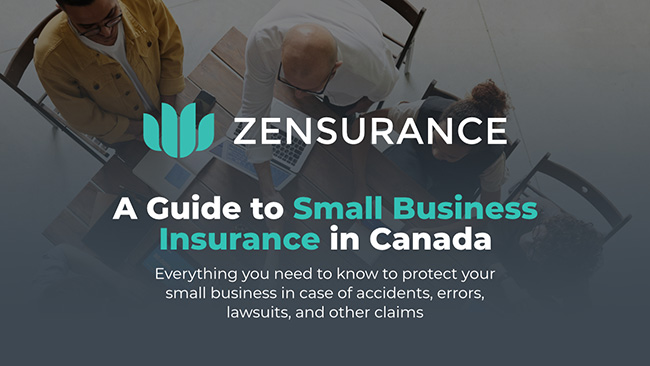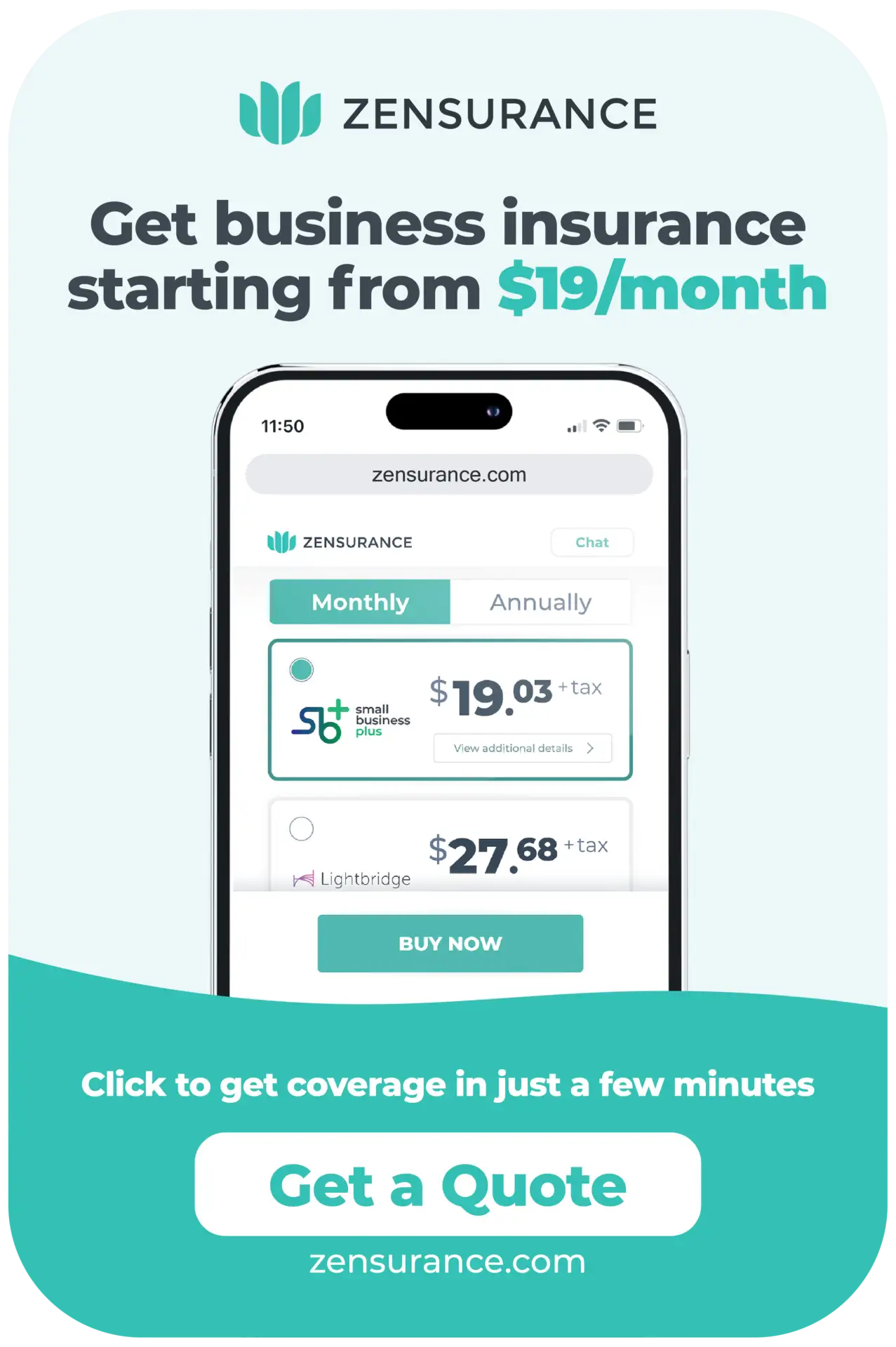Canadian small businesses are increasingly turning to artificial intelligence (AI) tools to boost productivity, save time, and reduce costs.
According to Statistics Canada, the use of AI tools by Canadian businesses for producing goods or delivering services has nearly doubled in one year, rising from 6.1% in the second quarter of 2024 to 12.2% in the second quarter of 2025.
It’s also worth noting that Canadian consumers’ adoption rates of generative AI platforms such as ChatGPT, Google Gemini and DALL-E have soared. According to the Canadian Internet Registration Authority, more than twice as many Canadians (33%) say they’ve used these kinds of tools in the past year compared to 2024, when just 16% said they had.
You have to be where your customers are to grow your small business, and those customers are increasingly using AI to search for the products, services, and information they need.

Related Posts
Categories
This guide offers an introduction to ChatGPT for small businesses new to AI and that are considering using tools like ChatGPT.
It outlines its functionalities, potential uses for boosting productivity, strategies for reducing liability risks, and recommended business insurance coverage associated with AI tool adoption.
What Is ChatGPT?
Developed by OpenAI, ChatGPT (Chat Generative Pretrained Transformer) is an AI tool that is a large language model (LLM). It’s part of a broader category of technologies known as generative AI.
ChatGPT can explain and analyze data, create content, summarize, and translate information a user gives it through the use of prompts.
Chat GPT-5 is expected to be released sometime in August and is said to combine various LLMs and other tools like Sora (for video creation) into a single interface to generate images, conduct research, or write code.
It’s important, however, to note that LLMs cannot “write”. Rather, they generate syntax, and are incapable of determining what is true and accurate.
What Is a Prompt?
A prompt when using ChatGPT refers to the input or instruction you provide to initiate or guide a conversation. It can be a question, a statement, a command, or even a block of text or code.
There are good and bad prompts. A good prompt allows a user to get the responses they want.
Good prompts are clear explanations that are easy to understand and that provide context.
How to Write Effective Search Prompts in ChatGPT
Here are a few tips to improve your prompts and get the information from ChatGPT you want:
Be specific. Avoid being vague and give as much detail as possible.
For example, if you want ChatGPT to craft an email to colleagues or employees about a specific topic, you could ask it to, “Write an internal email to colleagues using a professional tone and language requesting more information about next year’s advertising budget”, as opposed to asking it to, “write an email asking for information about the budget”.
Provide context. Explain to ChatGPT the role it plays when providing a reply to a prompt.
For example, if you have content about the benefits of a new product you want to use on your business’s website and wish to ensure it’s optimized to be easier to find on a search engine, you might tell it, “You are an expert SEO copywriter. Make copy edits that improve the search rankings of this webpage by incorporating keyphrases into it to drive more traffic to it through search engines.”
Determine a format. Tell ChatGPT how you want it to respond. Do you want a list, paragraph, or software code? For example, “Summarize this information in bullet points.”
Tell it the style you want it to use. When asking ChatGPT for help, specify the tone or style you would like it to use in its response.
For example, if you want it to write something casual and amusing for a social media post, tell it to, “Write a funny post for social media about working on a Monday morning using casual language”.
Simplify complex requests. Break up a prompt into smaller prompts if your initial ask is long or complex.
For example, the first prompt could be, “Suggest 10 product names for new work boots to sell to consumers.” The second prompt could be, “Write short descriptions for each product name.”
Give examples. Provide ChatGPT with examples of what it is you want.
For instance, if you’re trying to come up with a new slogan or tagline for a construction company, give it a prompt such as, “I want a slogan for my construction company like ‘build it and they will come’. Make it short, punchy, and inspirational”.
How Can Small Businesses Use ChatGPT?
There are numerous ways small business owners can utilize ChatGPT. Here are a few ideas:
Customer Service
ChatGPT can be used to help draft responses for an automated customer support chatbot, reply to customer inquiries and complaints, and generate a list of frequently asked questions and answers about your company and its products and services.
Example: An Amazon seller, retailer, or e-commerce wants to use a chatbot to handle questions about shipping from customers.
An effective prompt may be: “Write a friendly chatbot response for ‘how long does shipping within Canada take?”
Marketing and Advertising
ChatGPT aids marketing by generating social media content, refining webpages, enhancing blog drafts, creating ad images, and assisting with ad copy and email campaigns.
Example: A marketing manager wants to improve a description of a new product on their company’s website.
A good prompt to use may be: “Rewrite this product description to be more persuasive and SEO-friendly for a handmade beeswax candle – ‘beeswax candle in a glass jar, burns for 40 hours, made in Canada’.”
Strategy and Planning
ChatGPT quickly analyzes large amounts of data to extract key information. It helps with understanding customer data, market trends, predicting sales, and identifying patterns.
It’s also useful for brainstorming new product ideas and service offerings, as well as creating a SWOT (strengths, weaknesses, opportunities, threats) analysis for a company.
Example: A business owner of a cleaning company is generating a SWOT analysis of their business.
An effective prompt may be: “Create a SWOT analysis for a small, eco-friendly cleaning company operating in Canada. Focus on market trends, customer interest, and the competitive landscape.”
Business Operations
ChatGPT can streamline administrative functions, such as helping to draft refund, shipping and privacy policies, operating procedures, and aid in creating descriptions for available job openings.
Example: A business owner of a clothing store needs to draft a job description for hiring a salesperson.
An effective prompt may be: “Write a job description for a full-time retail sales associate at a boutique clothing store. Emphasize customer service skills, an interest in fashion, weekend availability, and a team-oriented attitude.”
Sales Lead Generation
ChatGPT helps generate personalized emails to customers, prospects, and partners to encourage them to engage with your organization.
Example: An independent bookkeeper wants to do a cold outreach to generate leads to other businesses.
A potential prompt to accomplish this may be: “Write a professional email introducing my bookkeeping services for small businesses. Emphasize affordability, accuracy, and how I can save them time doing financial tasks. Use a concise and friendly tone.”
ChatGPT can also connect to or integrate with many software tools and applications you may be using, such as Microsoft Office 365 and Outlook, Gmail and Google Workspace, Zapier, Zoom, Salesforce, Shopify, and GitHub Copilot.
What Are the Pros and Cons of Using ChatGPT for Business?
ChatGPT can be a valuable tool when used correctly. Of course, there are pros and cons to using ChatGPT or any AI tool to be aware of:
Pros:
- Efficiency and productivity. ChatGPT helps automate repetitive tasks and helps with content generation and data analysis. It can assist with strategic planning, sales forecasting, and decision-making.
- It’s cost-effective. It can support existing employees across departments as a collaborative assistant, enabling them to do more without increasing operational costs.
- Integrates with other software. ChatGPT can integrate with a broad range of productivity software to streamline workflows.
Cons:
- It may be inaccurate. ChatGPT and other AI tools may give incorrect, vague, or outdated responses to prompts and require human oversight.
- Output is dependent on effective prompts. What you give is what you get. The quality and accuracy of information you receive from ChatGPT or any AI tool is dependent on the quality of the prompts it’s given.
- Limited expertise. ChatGPT is fast and can leverage real-time information if it’s connected to the internet, but it doesn’t replace the knowledge, experience, and expertise of professionals.
What Liability Risks Do Businesses Face Using AI?
The most significant potential risk for business owners using AI tools is the possibility that the technology may produce incorrect or even hallucinatory results.
Other potential liability risks for business owners using AI may include:
- Inaccurate information: Using outdated or incorrect information can inadvertently cause financial or physical harm to customers or other third parties, potentially leading to lawsuits.
- Copyright infringement: Using copyright-protected content without consent could result in legal dispute with a copyright holder accusing you of copyright infringement or plagiarism.
- Privacy violations: Inputting confidential information or customer data into an AI tool can violate Canadian privacy laws, potentially leading to fines and a loss of customer trust.
- Overreliance: Using AI tools solely for mission-critical tasks without human supervision may lead to errors that result in legal disputes with customers or partners, as well as operational failures.
What Insurance Covers Use of ChatGPT and Other AI Tools?
A comprehensive business insurance policy is necessary to protect your small business, whether you decide to use AI technologies or not.
If you do use them, your policy should include the following:
- General liability insurance covers allegations from a customer or third party that your company’s use of AI caused them physical or financial harm.
- Professional liability insurance covers errors and mistakes an AI platform makes if it produces incorrect results or advice that results in your customers suffering financial losses.
- Cyber liability insurance protects against the financial consequences of data breaches and cyber-attacks. You are liable if an AI tool collects, stores, and processes confidential customer information and a data breach occurs.
- Technology errors and omissions (E&O) insurance addresses errors in your company’s technology products and services, or the failure to deliver them as promised. You may face a lawsuit if your AI technology causes financial harm or fails to meet customer expectations.
- Intellectual property insurance safeguards businesses from financial exposure stemming from intellectual property disputes, encompassing patents, trademarks, copyrights, and trade secrets.
While insurance offers a layer of protection, it is not a complete solution for managing all AI-related risks.
Effectively minimizing AI liability requires a multifaceted approach, including the adoption of data security protocols, conducting thorough risk assessments, providing comprehensive employee training, overseeing the responsible use of AI systems, and staying informed about evolving legal and regulatory requirements.
How to Get Low-Cost Insurance for Your Small Business
Zensurance is Canada’s leading small business insurance provider. Hundreds of thousands of small business owners and independent professionals rely on Zensurance to get the comprehensive, low-cost coverage they need.
Complete our online application for a free quote in just a few minutes.
Our friendly, knowledgeable team of licensed insurance brokers will shop our partner network of over 50 insurers to get the policy that suits your business, customize it to address your specific risks and budget, and issue policy documents and a certificate of insurance in 48 hours or less.
– Reviewed by Brandon Bowie, Senior Broker and Team Lead, Professional Lines, Zensurance.
Sign Up for ZenMail
"*" indicates required fields
Recent Posts
Zensurance $25,000 Business Grant Recipient: Sol & Sage Yoga
We are thrilled to announce the recipient of our $25,000 grant and recipients of our five $1,000 grants! Read on to learn valuable advice from these business owners for other entrepreneurs, and to discover why they consider insurance a crucial element of their financial stability.
How Canadian Small Businesses Can Use Artificial Intelligence (AI) to Increase Sales and Revenue
Using AI effectively can help Canadian small businesses attract more customers, increase sales, and improve customer service, often without new hires or large budgets. Many business owners are already using AI without realizing it. This guide explains how to start small, stay focused, and grow results in five practical steps.
5 Trends for 2026 Every Small Business Owner Should Know
See what’s hot for the year ahead with these five trends that Canadian small business owners and independent professionals should have on their radar in 2026, and how they can work them into their strategies.









